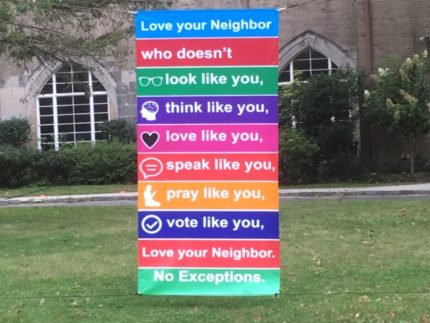By the Reverend Stephanie M. Johnson

St. Paul’s has a banner outside the church that says “Love your neighbor, who doesn’t look like you, think like you, speak like you, pray like you, vote like you. Love your neighbor, no exceptions.” The intent of the banner is to share with our community the scripturally based values that we believe are central to our faith life. Love of all is at the heart of everything we do for God and God’s people. It is a foundational principle which we share with our Jewish sisters and brothers through scripture and in our actions.
In our fractured nation and divided world, the concept of loving those who are vastly different from ourselves and whom we disagree may be challenging, and for some seemingly even impossible. Particularly as this election season comes to an end, stories of family and friends who are breaking relationships over deeply held partisan positions seems to push back against the idea of love of those we know, never mind the unknown neighbor. Becoming entrenched in our own opinions by limiting our relationships to those who agree with us may feel comforting, yet may limit our understanding of the diversity of God’s people.
So how do we reconcile our faith values and the commandment to love in our current divisive context? I believe we return to scriptures for guidance. We first hear about the love commandment in the Book of Leviticus in the Hebrew Scripture to “love our neighbors as yourself.” (19:18) I’ve learned in many conversations over the years that loving ourselves is sometimes a challenge for people. In a society where our self-esteem is based on professional success, possessions and physical attributes, we can easily forget that we are created perfectly in God’s image. Just by our being we born we are meant to love ourselves. When we believe that we are created in the image of God, we can recognize and embrace that others too are created in that very same image. As we see the image of God in others, even those who are different from us, we celebrate and love the diversity of all that God has created.
Jesus takes this love commandment even further saying in the Gospel of Matthew (5:43) “love your enemies and pray for those who persecute you.” For the people who were hearing Jesus’ message this must have been a radically disorienting thought. They were living under a brutally oppressive Roman Empire, which valued power and control over love and compassion. In this Matthew passage, Jesus uses the word “agape” in Greek. Compared to “eros” love which is intimate and passionate, “agape” love is the love that God has for humankind in our creation and in the sacrifice of Jesus on the cross. Jesus is telling all his followers that God’s unceasing love for humanity transcends power and control. Our response to God is to spread that very same agape love in our community, nation and world.
Loving others doesn’t mean that we must give up on our faith based principles. As stated in St. Paul’s banner, we know that God’s loving world has no place for intolerance, anti semitism, racism or homophobia. So my invitation to you (and to me!) as this election season winds down is to take a deep breath and try our absolute best to “love everyone, no exceptions.” After all, even though we may have disagreements, we are all created perfectly in God’s image.
The Reverend Stephanie M. Johnson is Rector of St. Paul’s Episcopal Church in Riverside.





